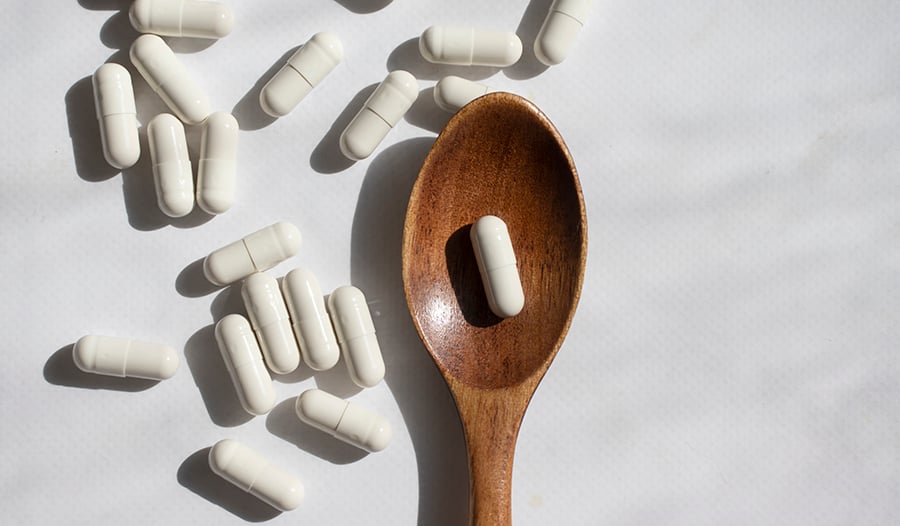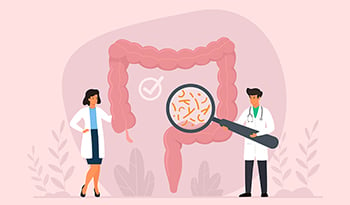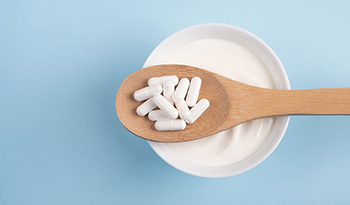Benefici per la salute intestinale del Clostridium Butyricum

Cos'è il Clostridium Butyricum?
Il Clostridium butyricum è un importante batterio intestinale. Si trova nel suolo, nei prodotti lattiero-caseari coltivati e nelle verdure. È disponibile anche come integratore alimentare probiotico . Uno dei suoi benefici principali è il consumo di fibra alimentare prebiotica e la sua scomposizione in acidi grassi a catena corta, come l'acido butirrico (butirrato) e l'acido acetico (acetato).1
Benefici del butirrato per la salute
Una delle funzioni principali del butirrato è quella di essere la fonte primaria di carburante per le cellule che rivestono l'intestino. Le cellule che rivestono l'intestino tenue e crasso utilizzano il butirrato per alimentare ogni aspetto della loro funzione. Il butirrato è utilizzato come fonte di energia per proteggere e rafforzare la barriera intestinale e regolare la contrazione intestinale ritmica che fa muovere il cibo ingerito attraverso l'intestino. Anche il butirrato produce benefici una volta assorbito dall'intestino. Contribuisce al corretto metabolismo degli zuccheri, del colesterolo e dei grassi nel sangue. Il butirrato e l'aumento dei batteri che producono butirrato nell'intestino sono promettenti per i disturbi digestivi e la salute del cervello.2,3
Benefici per la salute del Clostridium Butyricum
Migliora il microbioma intestinale
I batteri che producono butirrato nell'intestino umano, come il Clostridium butyricum, sono chiamati "sentinelle dell'intestino".4 Una sentinella è un soldato, una guardia o un'altra persona che fa la guardia.
Il Clostridium butyricum modella la composizione del microbioma intestinale attraverso la produzione di butirrato e la secrezione di varie sostanze antimicrobiche. L'effetto di queste secrezioni rende l'ambiente intestinale inospitale per batteri e altri microbi indesiderati. Inoltre, favorisce un ambiente favorevole ai batteri più desiderabili per la salute.
Aiuta a combattere la disbiosi
Questo effetto sul miglioramento della composizione del microbioma rende il Clostridium butyricum un candidato forte per migliorare la disbiosi, uno squilibrio di microrganismi nel microbioma intestinale. La disbiosi può essere causata da una carenza di secrezioni digestive, dalla dieta, dall'uso di antibiotici e da fattori genetici. La disbiosi è associata ad alterazioni della funzione digestiva (gas, gonfiore, indigestione, ecc.), alla sindrome dell'intestino chiuso, alla nebbia cerebrale, a disturbi metabolici e ad altri disturbi. Il Clostridium butyricum è considerato un candidato promettente per migliorare la disbiosi.1
Riduce le perdite intestinali
Oltre agli effetti sulla produzione di butirrato e sulla composizione del microbioma, il Clostridium butyricum influisce anche sulla barriera intestinale e sulle cellule immunitarie.1 Ciò lo rende potenzialmente molto utile nella sindrome del leaky gut.
La barriera intestinale è fondamentale per la salute, in quanto funge da tessuto altamente assorbente che tiene lontani i composti e i microrganismi nocivi. Si compone di tre strati: lo strato esterno, caratterizzato da muco, anticorpi e proteine antimicrobiche; lo strato intermedio, costituito da cellule intestinali collegate da proteine di giunzione stretta; la lamina propria interna, uno strato di tessuto connettivo ricco di cellule immunitarie che svolgono varie funzioni.
Modelli sperimentali indicano che il Clostridium butyricum migliora la funzione di tutti e tre gli strati della barriera intestinale aumentando la produzione di butirrato e potenziando la produzione di proteine della giunzione stretta, che contribuiscono a ridurre la permeabilità intestinale.
Aumenta la salute delle difese immunitarie
Il Clostridium butyricum influenza le cellule immunitarie, determinando una riduzione dell'infiammazione e il rilascio di mediatori pro-risoluzione che migliorano la salute della barriera intestinale.
Le evidenze scientifiche sostengono il ruolo del Clostridium butyricum nel proteggere dai danni alla barriera intestinale e nel promuovere la sua integrità e, se danneggiata, la sua guarigione.1
Clostridium Butyricum in modelli animali sperimentali
Gran parte dell'entusiasmo e del potenziale del Clostridium butyricum è dovuto ai risultati ottenuti nei modelli animali. In questi studi, il Clostridium butyricum ha mostrato una miriade di benefici per la salute e potenziali applicazioni cliniche. Questo include la promozione della salute dell'apparato digerente e della funzione di barriera dell'intestino, ma la ricerca è abbastanza solida per molti benefici per la salute al di là di queste applicazioni ovvie.
Ad esempio, le alterazioni metaboliche nel controllo degli zuccheri nel sangue e nel metabolismo energetico sono migliorate in questi modelli animali attraverso una serie molto complessa di azioni che migliorano l'azione dell'insulina e la produzione di energia nel pancreas, nel tessuto adiposo e nel fegato nei modelli animali di alterazione del metabolismo umano. Questi studi aprono la possibilità che il Clostridium butyricum possa aiutare a sostenere i livelli di glucosio nel sangue come parte di un programma di gestione del peso.1
Studi clinici sull'uomo con Clostridium Butyricum
Finora sono stati condotti 28 studi clinici controllati sull'uomo con il Clostridium butyricum a sostegno della sua sicurezza e dei suoi benefici per la salute. La maggior parte di questi studi ha incluso altre specie probiotiche, mentre sette studi hanno utilizzato solo Clostridium butyricum.
Tra i benefici per la salute riscontrati in questi studi con il solo Clostridium butyricum vi è la capacità di prevenire la diarrea associata agli antibiotici e il disagio digestivo associato all'uso di antibiotici, e di produrre miglioramenti nella funzione della barriera intestinale, nella composizione del microbioma, nei sintomi digestivi, nella frequenza e nella qualità dei movimenti intestinali, nell'umore, nella funzione epatica e nella funzione immunitaria.1,5-12
Gli studi sull'uomo finora completati sono coerenti con l'ampia mole di dati provenienti da modelli animali, ma sono necessarie ulteriori ricerche cliniche per determinare il grado di miglioramento della salute offerto da specifici ceppi di Clostridium butyricum e il dosaggio adeguato.
Bibliografia:
- Stoeva MK, Garcia-So J, et al. Il simbionte intestinale umano produttore di butirrato, Clostridium butyricum e il suo ruolo nella salute e nella malattia. Microbi intestinali. 2021 Jan-Dec;13(1):1-28.
- Zhu LB, Zhang YC, Huang HH, Lin J. Prospettive di applicazione clinica dei batteri produttori di butirrato. World J Clin Pediatr. 2021 Sep 9;10(5):84-92.
- Facchin S, Bertin L, Bonazzi E, et al. Acidi grassi a catena corta e salute umana: Dalle vie metaboliche alle attuali implicazioni terapeutiche. Life (Basilea). 2024 Apr 26;14(5):559.
- Singh V, Lee G, Son H, et al. Produttori di butirrato, "la sentinella dell'intestino": Il loro significato intestinale con e oltre il butirrato e l'uso prospettico come terapie microbiche. Front Microbiol. 2023 Jan 12;13:1103836.
- Seki H, Shiohara M, Matsumura T, Miyagawa N, Tanaka M, Komiyama A, Kurata S. Prevenzione della diarrea associata ad antibiotici nei bambini mediante Clostridium butyricum MIYAIRI. Pediatr Int. 2003;45:86-90.
- Tomita Y, Ikeda T, Sakata S, et al. Associazione della terapia probiotica con Clostridium butyricum con la sopravvivenza e la risposta al blocco del checkpoint immunitario nei pazienti con cancro al polmone. Cancer Immunol Res. 2020;8:1236-1242.
- Imase K, Takahashi M, Tanaka A, et al. Efficacia della preparazione di Clostridium butyricum in concomitanza con la terapia di eradicazione dell'Helicobacter pylori in relazione ai cambiamenti del microbiota intestinale. Microbiol Immunol. 2008;52:156-161.
- Sun YY, Li M, Li YY, et al. L'effetto del Clostridium butyricum sui sintomi e sul microbiota fecale nella sindrome dell'intestino irritabile dominata dalla diarrea: uno studio randomizzato, in doppio cieco, controllato con placebo. Sci Rep. 2018;8:2964.
- Yasueda A, Mizushima T, Nezu R, et al. L'effetto di Clostridium butyricum MIYAIRI sulla prevenzione della pouchite e sull'alterazione del profilo del microbiota in pazienti con colite ulcerosa. Surg Today. 2016;46:939-949.
- Miyaoka T, Kanayama M, Wake R, et al. Clostridium butyricum MIYAIRI 588 come terapia aggiuntiva per il disturbo depressivo maggiore resistente al trattamento: uno studio prospettico in aperto. Clin Neuropharmacol. 2018;41:151-155.
- Liu L, Chen X, Liu L, Qin H. Il Clostridium butyricum migliora potenzialmente l'immunità e la nutrizione attraverso l'alterazione del microbiota e del metabolismo degli anziani malnutriti in assistenza a lungo termine. Nutrienti. 2022 Aug 28;14(17):3546.
- Zhu W, Yan M, Cao H, et al. Effetti delle capsule di Clostridium butyricum combinate con la Rosuvastatina sulla flora intestinale, sul metabolismo dei lipidi, sulla funzione epatica e sull'infiammazione nei pazienti con NAFLD. Cell Mol Biol (Noisy-le-grand). 2022 Feb 28;68(2):64-69.
ESONERO DI RESPONSABILITÀ:Questo Centro Benessere non intende fornire diagnosi...

















































































 Indice
Indice















